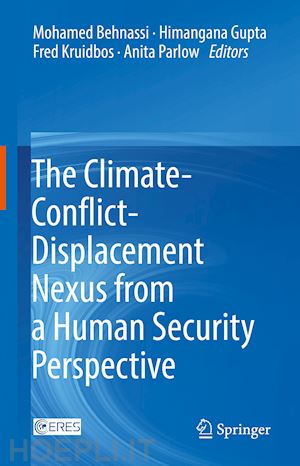Dr. Mohamed Behnassi is a Full Professor at the College of Law, Economics, and Social Sciences of Agadir, Ibn Zohr University, Morocco. He is a Senior Researcher of international law and politics of environment and human security. He holds a PhD in International Environmental Law and Governance from Hassan II University of Casablanca, 2003, a Diploma in International Environmental Law and Diplomacy from the University of Eastern Finland and UNEP, 2015. He is also an Alumnus of the International Visitors Leadership Program of the Department of State, United States of America. Dr. Behnassi is currently the Founding Director of the Center for Environment, Human Security and Governance (CERES) – Former North-South Center for Social Sciences (NRCS). From 2015 to 2018, he was the Director of the Research Laboratory for Territorial Governance, Human Security and Sustainability (LAGOS) and Head of the Public Law Department, College of Law, Economics, and Social Sciences of Agadir. Recently, he was appointed as Expert Evaluator for the National Center for Scientific and Technical Research (CNRST/Morocco), and selected as Expert by the Intergovernmental Science-Policy Platform on Biodiversity and Ecosystem Services (IPBES) and the Mediterranean Experts on Climate and Environmental Change (MEDECC) to take part in global and regional assessments, respectively. Accordingly, he was among the Lead Authors of the 1st Assessment Report (MAR1): Climate and Environmental Change in the Mediterranean Basin - Current Situation and Risks for the Future (MEDECC, 2021). Dr. Behnassi has published considerable number of scientific papers and book chapters in addition to 17 books, including recent ones on: Social-Ecological Systems in the Era of Risks and Insecurity - Pathways to Viability and Resilience (Springer, 2021); Building Resilience for Food and Water Security Face to Climate Change and Biodiversity Decline - Perspectives from Asia, Middle-East and Africa (Springer, 2021); and Human and Environmental Security in the Era of Global Risks (Springer International Publishing, 2019). Dr. Behnassi organized as well many international conferences covering the above research areas, managed many research and expertise projects, and is regularly requested to provide scientific expertise nationally and internationally. Other professional activities include social compliance auditing and consultancy by monitoring human rights at work and the sustainability of the global supply chain.
Dr. Himangana Gupta is a JSPS-UNU Postdoctoral Fellow at the United Nations University Institute for the Advanced Study of Sustainability (UNU-IAS) and the University of Tokyo, Japan. She received her doctorate in Environment Science from Panjab University, India in 2015. She has worked on climate change and biodiversity policy and diplomacy, and is currently working on linkages between biodiversity, climate, and communities in socio-ecological production landscapes. Before this, she was a part of the National Communication Cell (NATCOM) of the Indian Ministry of Environment, Forest and Climate Change. She contributed to India’s Second Biennial Update Report and several other publications of the Ministry. She is a Certified Expert in Climate Adaptation Finance. She is a University Gold Medallist and recipient of Academic Excellence Award. She has published three edited books with Springer and has also written research papers in reputed international and national journals on climate policy, forestry, biodiversity, and women in climate change mitigation and adaptation.
Fred Kruidbos is a (population) biologist specialized in animal ecology. He is an independent researcher and the director of K-SN Ecological Services B.V. Based in the Netherlands, this company operates worldwide and consists of three branches focused on: (i) ecological research and consultancy, (ii) ecological products, and (iii) ecological safety and security services. This setup makes it possible to study problems from a multidimensional approach facilitating more holistic solutions. Mr. Kruidbos studied at the prestigious Wageningen University (population biology) and Fontys University of Applied Science Tilburg (teacher training). During and after his studies, he conducted research on various prey-predator and host-vector related studies. His current research is pragmatic in nature and focuses mainly on the interface between spatial planning and nature conservation. Recently expanded with safety and security issues of which his contributions to this book are an example. In addition to being a biologist, Mr. Kruidbos is a Sr. Operational advisor attached to the Dutch army. During his military service (compulsory in the Netherlands at the time) he was trained with the Dutch Special Forces and completed his operational period as a team member. In addition to his civil studies, he completed the training as reserve officer and seni











